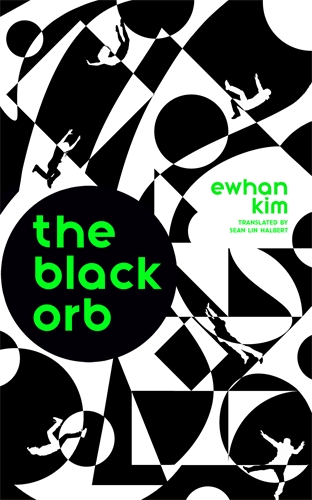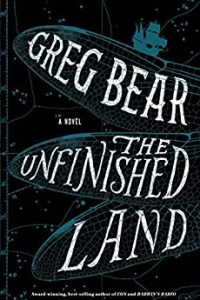The Black Orb by Ewhan Kim: Review by Ian Mond
 The Black Orb, Ewhan Kim (Serpent’s Tail 978-1-80081-572-8, £14.99, 368pp, tp) August 2024. (Mira 978-0-77838-734-8, $28.99, 304pp, tp) February 2025.
The Black Orb, Ewhan Kim (Serpent’s Tail 978-1-80081-572-8, £14.99, 368pp, tp) August 2024. (Mira 978-0-77838-734-8, $28.99, 304pp, tp) February 2025.
There’s little written in English about South Korean science fiction author and critic Ewhan Kim. A brief profile of Kim written by the author on the ‘‘Science Fiction Writers Union of the Republic of Korea’’ tells us he became ‘‘a writer after reading Bradbury’s The Martian Chronicles’’ and since 2004 has published 14 novels and co-authored six short story collections. Goodreads records one of the 14 novels, the only one to be translated into English, the one I’m about to review. If I sound a little frustrated, it’s because, having read The Black Orb (translated by Sean Lin Halbert), I’d love to know more about Kim’s views on South Korean contemporary and genre fiction (in the profile quoted above, Kim expresses a love for Robert Heinlein, Ray Bradbury, Yann Martel and Virginia Woolf). I acknowledge that writing for a South Korean audience, Kim is not obligated to explain himself in English (it’s worth noting that the UK edition, released last year, has an afterword from the author, which is missing from my copy of the US ARC). Still, The Black Orb is a conversation starter, a novel first published in 2009 that raises timely questions about masculinity, egoism, misinformation, and a distrust of authority.
The Black Orb’s striking opening has our protagonist, Jeong-su, out for a walk on a hot Sunday evening, ciggies and lighter in hand. Still fuming over an argument with his father, it takes a moment before Jeong-su registers an object blocking the alley. ‘‘It was perfectly round and didn’t reflect light. Jeong-su felt like he was staring into a hole in the fabric of space. The object was several steps away from him.’’ Moments later, Jeong-su’s neighbour, who thinks the sphere might be a balloon, touches the orb and –
his fingers passed through it and into the inky blackness…. It happened so fast that the neighbour couldn’t even process it. It was only when the thing reached his shoulder that he began panicking. He dug his heels into the ground to stop himself from going any farther, but it was too little too late.
With the neighbour sucked into the orb, the object turns its attention to Jeong-su, steadily moving toward him. He runs. Gets into his car. Heads toward his parents, hoping to warn them. In the meantime, that single black orb remorselessly moves through the streets of Seoul, impervious to bullets, swallowing up any person it touches. The shit really hits the fan when the orb begins to multiply.
The typical postapocalyptic protagonist is a rugged, courageous, intelligent, and pragmatic individual. Jeong-su is not that person. Indeed, he is self-obsessed, vain, and timid, not just unlikeable but actively unsympathetic. We can initially forgive Jeong-su’s selfishness. He’s frightened, confused, and desperate to find his parents, who have gone missing. But as Jeong-su’s survival instincts kick in, the better angels of his nature take a holiday. At one point, he’s rescued by a Church group who bring him to a school where they’ve discovered a means of controlling an orb by encircling it while holding hands. Jeong-su distrusts them immediately, believing their acts of altruism hide darker motives. Later, his life is threatened by a brutal gang of killers, but even when they have Jeong-su naked and on his knees, pleading for his life, there’s still something decidedly disagreeable about him.
During the longest section of the novel, where Jeong-su finds refuge in a department store with fellow survivor Jong-seok, we gain an insight into his psychology. He talks, almost excitedly, about the punishments, the beatings and hazings he experienced in the Army. He recalls going a whole day without ‘‘getting hit once. That night, I stayed up all night wondering to myself why I hadn’t gotten hit that day. I was so used to violence that it bothered me not to be bullied.’’ When he joins the workforce as a salesman, he’s exposed to a misogynistic mindset where the objectification of women, entertaining his clients by paying for sex workers, is an established way of doing business. There is a cultural component to Jeong-su’s experience – which also includes internalised homophobia – that I’m not privy to. I can speculate but can’t speak with any confidence about the effect mandated military service has on the psychology of South Korean men. But that’s not to say that Jeong-su’s view on masculinity and women is alien. His attitude bears a striking and disturbing resemblance to incel culture, the Proud Boys, and Andrew Tate.
The novel was released in South Korea as The Orb of Despair, a title I wish they’d kept. It speaks to the book’s overriding emotion as these inscrutable, unstoppable, and ruthless monsters, travelling four kilometres per hour, offer no chance of escape. As we saw with COVID, despair creates its own weather system – one saturated with misinformation, rumour, and vilification of authority figures. Kim, of course, isn’t responding to COVID; The Black Orb predates the pandemic by 11 years. This isn’t prescience on Kim’s part (although it feels that way) but rather a frank appraisal of human nature that recognises our cathartic need to strike out at the elite, the experts, and anyone in power during times of panic and tragedy.
The Black Orb’s brutal and nihilistic climax won’t be everyone’s cup of tea. And yet, it’s an ending that’s true to the novel’s worldview – a truth about selfishness, cruelty, distrust, and paranoia that we might not want to acknowledge but, right now, is hard to dismiss.
Interested in this title? Your purchase through the links below brings us a small amount of affiliate income and helps us keep doing all the reviews you love to read!
Ian Mond loves to talk about books. For eight years he co-hosted a book podcast, The Writer and the Critic, with Kirstyn McDermott. Recently he has revived his blog, The Hysterical Hamster, and is again posting mostly vulgar reviews on an eclectic range of literary and genre novels. You can also follow Ian on Twitter (@Mondyboy) or contact him at mondyboy74@gmail.com.
This review and more like it in the March 2025 issue of Locus.
 While you are here, please take a moment to support Locus with a one-time or recurring donation. We rely on reader donations to keep the magazine and site going, and would like to keep the site paywall free, but WE NEED YOUR FINANCIAL SUPPORT to continue quality coverage of the science fiction and fantasy field.
While you are here, please take a moment to support Locus with a one-time or recurring donation. We rely on reader donations to keep the magazine and site going, and would like to keep the site paywall free, but WE NEED YOUR FINANCIAL SUPPORT to continue quality coverage of the science fiction and fantasy field.
©Locus Magazine. Copyrighted material may not be republished without permission of LSFF.








